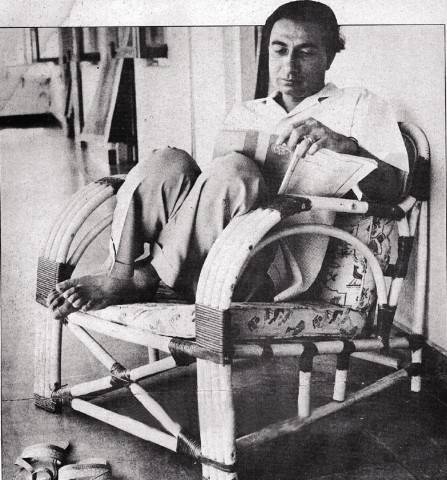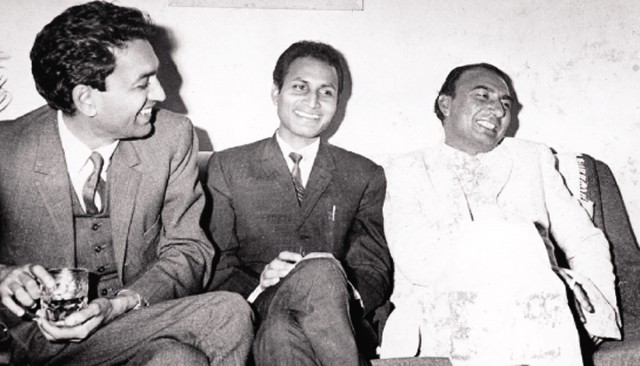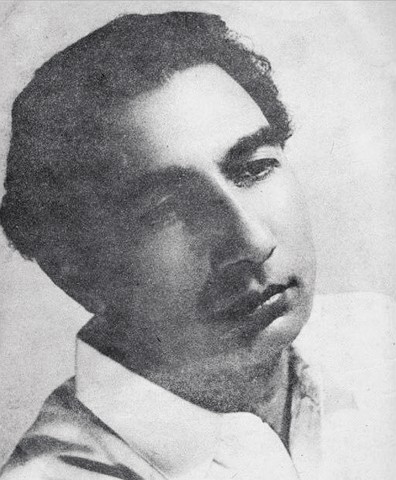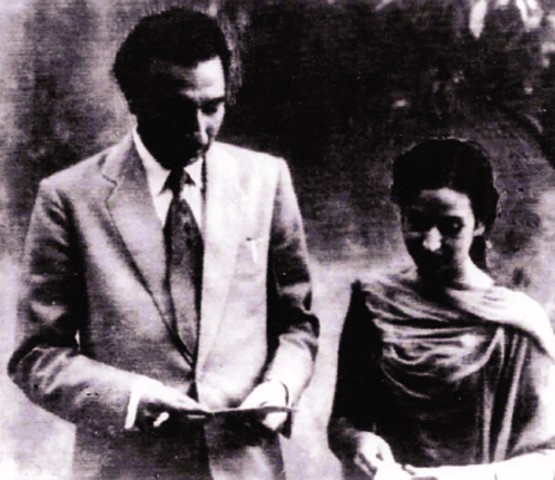
Sahir Ludhianvi made his place among Urdu Progressive poets with Taj Mahal, where for the first time the past was presented as deprivation rather than prosperity; and people’s alienation rather than colonial resources have been given a place. The uber-famous Taj Mahal was sung beautifully by Mohammad Rafi in the 1964 film Ghazal.
“Taj tere liye ik mazhar-e-ulfat hi sahi
Tujh ko is vaadi-e-rangeen se aqeedat hi sahi
Meri mehboob kahin aur mila kar mujh se!
Bazm-e-shahi mein ghareebon ka guzar kya maani?
Sabt jis raah pe hon satvat-e-shaahi ke nishan
Us pe ulfat bhari roohon ka safar kya maani?
Meri mahboob, pas-e-parda-e-tashheer-e-vafaa

Tu ne satvat ke nishaanon ko to dekha hota?
Murda-shahon ke maqaabir se bahalne vaali
Apne tareek makaanon ko to dekha hota?
An-ginat logon ne duniya mein mohabbat ki hai

Kaun kehta hai ke sadeq na the jazbe un ke?
Lekin un ke liye tashheer ka saamaan nahin
Kyon ke vo log bhi apni hi tarah muflis the
Ye imaaraat, vo maqaabir ye faseelen ye hisaar
Mutlaq-ul-hukm shahenshahon ki azmat ke sutoon
Daaman-e-dahr pe us rang ki gulkaari hai
Jis mein shaamil hai tire aur mire ajdaad ka ḳhoon
Meri Mehboob, unhen bhi to mohabbat hogi
Jin ki sannaai ne baḳhshi hai use shakl-e-jameel
Un ke pyaaron ke maqaabir rahe benaam-o-namood
Aaj tak un pe jalaayi na kisi ne qandeel
Ye chamanzaar ye Jamunaa ka kinaaraa, ye mahal
Ye munaqqash dar-o-deevaar, ye mehraab, ye taaq
Ek shahenshah ne daulat ka sahara le kar
Ham ghareebon ki mohabbat ka udaaya hai mazaaq!
Meri mehboob kahin aur mila kar mujh se!”
(The Taj may be a symbol of love for you
And you may place faith in that verdant valley
But my love, please meet me elsewhere.
What is the meaning of the presence of the poor in these palaces?
On the paths, where the majesty of kings has been etched
Why should loving souls sojourn here?
My love, behind the curtain of exhibitionist romance
Do you not observe the marks of elitism?
You who are calmed in the mausoleums of dead kings
Could you not cast a look at your own dark house?
Countless people have fallen in love before
Who says their emotions were not authentic?
But this indelible memory is not for them
For they, like us, were poor.
This building, those tombs, these parapets, that fort
The signs of the grandeur of sovereign kings
Are like rose-hued writing on the face of this world
That has been coloured with the blood of your ancestors and mine.
My beloved, they too must have loved passionately
They – whose craft has given (the Taj) its beautiful visage
Their loved ones lie in unmarked graves
Where no one even lights a candle.
These gardens, these banks of the Jamuna, this palace
These intricately carved walls and doors and awnings
An emperor has used his immense wealth to mock the love of us poor.
My love, meet me anywhere but here.)
A more profound reaction than this is to be found in his poem Khudkushi Se Pehle (Before the Suicide):
“Zindagi fitrat-e-be-his ki purani taqseer
Aik haqeeqat thi magar chand fasanon mein kati”
(Life is the old sin of insensitive nature
It was a reality but spent within a few stories)
Sahir’s other successful poems are Chakle (Brothels), Gurez (Escape), Lamha-e-Ghaneemat (Blessed Moment), Bengal, Fankar (Artist), Kal Aur Aaj (Yesterday and Today), Isi Doraahe Par (On This Crossroads), Aik Tasveer-e-Rang (A Colour Portrait), Aik Shaam (One Evening), the aforementioned Khudkushi Se Pehle, Nur Jahan Ke Mazar Par (At the Tomb of Nur Jahan), Jageer (Estate), Maadaam (Madame), Mafaahmat (Compromise), Naya Safar Hai Purane Chiragh Gul Kar Do (It Is a New Journey Extinguish the Old Lamps), Shikast-e-Zindaan (Defeat in the Dungeon) and Lahu Nazar De Rahi Hai Hayat (Life Is Giving An Offering of Blood). The quality of all these poems is the symmetrical style of Sahir which is not impeded by waywardness and artificiality. Thus there is a skill in presenting those experiences which he has been able to access.
After entering the film world, he almost renounced poetry, but even in film songs, he has given space to progressive inclinations with great excellence. His film songs are full of melody and rhythm on one hand, on the other there is a feeling of new conditions and new issues within them. In this period, he wrote a long poem on the theme of peace Parchhaiyan. It is arguably the best poem on this theme yet.

For this centenary piece, I have chosen to translate two other poems from Sahir. The first is a qataa (quatrain) that exemplifies the defiance of Sahir the poet.
“Vajh-e-be-rangi-e-gulzaar kahoon to kya ho?
Kaun hai kitna gunahgaar kahoon to kya ho?
Tum ne jo baat sar-e-bazm na sun-na chaahi
Main vahi baat sar-e-daar kahoon to kya ho?”
(What if I told you why the garden had no colour?
What if I outed those whose sins had caused this squalour?
Those words you do not wish whispered in civil soirées
What if those very words on the gallows I holler?)
The second is a selection from his film work: “Main pal do pal ka shayar hoon” from the blockbuster 1976 film Kabhie Kabhie.
“Main pal do pal ka shayar hoon
Pal do pal meri kahani hai
Pal do pal meri hasti hai
Pal do pal meri javani hai
Mujh se pahle kitne shayar aaye aur aa kar chale gaye
Kuchh aahen bhar kar laut gaye kuchh naghme ga kar chale gaye
Voh bhi ek pal ka qissa the main bhi ek pal ka qissa hoon
Kal tum se juda ho jaoonga, go aaj tumhara hissa hoon
Har nasl ek fasl hai dharti ki, aaj ugti hai kal kat-ti hai
Jeevan vo mehngi midra hai jo qatra qatra bat-ti hai
Pal do pal main ne sunaya hai, itni hi sa-aadat kaafi hai
Pal do pal tum ne mujh ko suna, itni hi inayat kaafi hai
Kal aur aayenge naghmon ki khilti kaliyan chunne vale
Mujh se behtar kahne vale tum se behtar sunne vale
Kal koi mujh ko yaad kare? Kyon koi mujh ko yaad karey?
Masroof zamana mere liye kyon vaqt apna barbaad karey?
Main pal do pal ka shayar hoon”
(I am a poet of a few moments
And a few moments’ worth is my story
A few moments’ worth is my existence
And a few moments’ worth is my youth.
Before me, so many poets came and went away
Some sighed in great anguish and left; others sang their songs and left too
They were the story of a few moments
I am a story of a few moments, too
Tomorrow, I’ll be separated from you
Though I feel an integral part of you.
Every generation is a crop, grown today and harvested tomorrow
And life is that expensive liquor that is distributed by the drop
I have recited for a moment or two, this fortune is enough
You have listened for a moment or two, this favour too is enough.
Tomorrow, there will be others who will pluck the flowering buds of songs
Those who speak better than me, and those who listen better than you
Tomorrow, will someone remember me? Why at all should they remember me?
Why should this busy world waste its time for someone as inconsequential as me?
I am a poet of a few moments.)
In short, when we examine Sahir Ludhianvi’s verses, apart from happenings in the world, an aspect of autobiography can also be glimpsed here and there. They can often be a companion of a few moments, through which the reader can have a perception of the human problems confronting the 20th century and also meet the poet himself from time to time.
“Vese toa tumhi ne mujhe barbaad kiya hai
Ilzaam kisi aur ke sar jaaye toa achha”
(Though you are the cause of my ruination
All is well if somebody else shoulders the accusation)
All translations are by the writer.
Raza Naeem is a Pakistani social scientist, book critic and award-winning translator and dramatic reader, currently based in Lahore, where he is also the president of the Progressive Writers Association. He is currently working on a book ‘Sahir Ludhianvi’s Lahore, Lahore’s Sahir Ludhianvi’, forthcoming in 2021. He can be reached at razanaeem@hotmail.com
“Taj tere liye ik mazhar-e-ulfat hi sahi
Tujh ko is vaadi-e-rangeen se aqeedat hi sahi
Meri mehboob kahin aur mila kar mujh se!
Bazm-e-shahi mein ghareebon ka guzar kya maani?
Sabt jis raah pe hon satvat-e-shaahi ke nishan
Us pe ulfat bhari roohon ka safar kya maani?
Meri mahboob, pas-e-parda-e-tashheer-e-vafaa

Tu ne satvat ke nishaanon ko to dekha hota?
Murda-shahon ke maqaabir se bahalne vaali
Apne tareek makaanon ko to dekha hota?
An-ginat logon ne duniya mein mohabbat ki hai

Kaun kehta hai ke sadeq na the jazbe un ke?
Lekin un ke liye tashheer ka saamaan nahin
Kyon ke vo log bhi apni hi tarah muflis the
Ye imaaraat, vo maqaabir ye faseelen ye hisaar
Mutlaq-ul-hukm shahenshahon ki azmat ke sutoon
Daaman-e-dahr pe us rang ki gulkaari hai
Jis mein shaamil hai tire aur mire ajdaad ka ḳhoon
Meri Mehboob, unhen bhi to mohabbat hogi
Jin ki sannaai ne baḳhshi hai use shakl-e-jameel
Un ke pyaaron ke maqaabir rahe benaam-o-namood
Aaj tak un pe jalaayi na kisi ne qandeel
Ye chamanzaar ye Jamunaa ka kinaaraa, ye mahal
Ye munaqqash dar-o-deevaar, ye mehraab, ye taaq
Ek shahenshah ne daulat ka sahara le kar
Ham ghareebon ki mohabbat ka udaaya hai mazaaq!
Meri mehboob kahin aur mila kar mujh se!”
(The Taj may be a symbol of love for you
And you may place faith in that verdant valley
But my love, please meet me elsewhere.
After entering the film world, he almost renounced poetry, but even in film songs, he has given space to progressive inclinations
What is the meaning of the presence of the poor in these palaces?
On the paths, where the majesty of kings has been etched
Why should loving souls sojourn here?
My love, behind the curtain of exhibitionist romance
Do you not observe the marks of elitism?
You who are calmed in the mausoleums of dead kings
Could you not cast a look at your own dark house?
Countless people have fallen in love before
Who says their emotions were not authentic?
But this indelible memory is not for them
For they, like us, were poor.
This building, those tombs, these parapets, that fort
The signs of the grandeur of sovereign kings
Are like rose-hued writing on the face of this world
That has been coloured with the blood of your ancestors and mine.
My beloved, they too must have loved passionately
They – whose craft has given (the Taj) its beautiful visage
Their loved ones lie in unmarked graves
Where no one even lights a candle.
These gardens, these banks of the Jamuna, this palace
These intricately carved walls and doors and awnings
An emperor has used his immense wealth to mock the love of us poor.
My love, meet me anywhere but here.)
A more profound reaction than this is to be found in his poem Khudkushi Se Pehle (Before the Suicide):
“Zindagi fitrat-e-be-his ki purani taqseer
Aik haqeeqat thi magar chand fasanon mein kati”
(Life is the old sin of insensitive nature
It was a reality but spent within a few stories)
Sahir’s other successful poems are Chakle (Brothels), Gurez (Escape), Lamha-e-Ghaneemat (Blessed Moment), Bengal, Fankar (Artist), Kal Aur Aaj (Yesterday and Today), Isi Doraahe Par (On This Crossroads), Aik Tasveer-e-Rang (A Colour Portrait), Aik Shaam (One Evening), the aforementioned Khudkushi Se Pehle, Nur Jahan Ke Mazar Par (At the Tomb of Nur Jahan), Jageer (Estate), Maadaam (Madame), Mafaahmat (Compromise), Naya Safar Hai Purane Chiragh Gul Kar Do (It Is a New Journey Extinguish the Old Lamps), Shikast-e-Zindaan (Defeat in the Dungeon) and Lahu Nazar De Rahi Hai Hayat (Life Is Giving An Offering of Blood). The quality of all these poems is the symmetrical style of Sahir which is not impeded by waywardness and artificiality. Thus there is a skill in presenting those experiences which he has been able to access.
When we examine Sahir Ludhianvi’s verses, apart from happenings in the world, an aspect of autobiography can also be glimpsed here and there
After entering the film world, he almost renounced poetry, but even in film songs, he has given space to progressive inclinations with great excellence. His film songs are full of melody and rhythm on one hand, on the other there is a feeling of new conditions and new issues within them. In this period, he wrote a long poem on the theme of peace Parchhaiyan. It is arguably the best poem on this theme yet.

For this centenary piece, I have chosen to translate two other poems from Sahir. The first is a qataa (quatrain) that exemplifies the defiance of Sahir the poet.
“Vajh-e-be-rangi-e-gulzaar kahoon to kya ho?
Kaun hai kitna gunahgaar kahoon to kya ho?
Tum ne jo baat sar-e-bazm na sun-na chaahi
Main vahi baat sar-e-daar kahoon to kya ho?”
(What if I told you why the garden had no colour?
What if I outed those whose sins had caused this squalour?
Those words you do not wish whispered in civil soirées
What if those very words on the gallows I holler?)
The second is a selection from his film work: “Main pal do pal ka shayar hoon” from the blockbuster 1976 film Kabhie Kabhie.
“Main pal do pal ka shayar hoon
Pal do pal meri kahani hai
Pal do pal meri hasti hai
Pal do pal meri javani hai
Mujh se pahle kitne shayar aaye aur aa kar chale gaye
Kuchh aahen bhar kar laut gaye kuchh naghme ga kar chale gaye
Voh bhi ek pal ka qissa the main bhi ek pal ka qissa hoon
Kal tum se juda ho jaoonga, go aaj tumhara hissa hoon
Har nasl ek fasl hai dharti ki, aaj ugti hai kal kat-ti hai
Jeevan vo mehngi midra hai jo qatra qatra bat-ti hai
Pal do pal main ne sunaya hai, itni hi sa-aadat kaafi hai
Pal do pal tum ne mujh ko suna, itni hi inayat kaafi hai
Kal aur aayenge naghmon ki khilti kaliyan chunne vale
Mujh se behtar kahne vale tum se behtar sunne vale
Kal koi mujh ko yaad kare? Kyon koi mujh ko yaad karey?
Masroof zamana mere liye kyon vaqt apna barbaad karey?
Main pal do pal ka shayar hoon”
(I am a poet of a few moments
And a few moments’ worth is my story
A few moments’ worth is my existence
And a few moments’ worth is my youth.
Before me, so many poets came and went away
Some sighed in great anguish and left; others sang their songs and left too
They were the story of a few moments
I am a story of a few moments, too
Tomorrow, I’ll be separated from you
Though I feel an integral part of you.
Every generation is a crop, grown today and harvested tomorrow
And life is that expensive liquor that is distributed by the drop
I have recited for a moment or two, this fortune is enough
You have listened for a moment or two, this favour too is enough.
Tomorrow, there will be others who will pluck the flowering buds of songs
Those who speak better than me, and those who listen better than you
Tomorrow, will someone remember me? Why at all should they remember me?
Why should this busy world waste its time for someone as inconsequential as me?
I am a poet of a few moments.)
In short, when we examine Sahir Ludhianvi’s verses, apart from happenings in the world, an aspect of autobiography can also be glimpsed here and there. They can often be a companion of a few moments, through which the reader can have a perception of the human problems confronting the 20th century and also meet the poet himself from time to time.
“Vese toa tumhi ne mujhe barbaad kiya hai
Ilzaam kisi aur ke sar jaaye toa achha”
(Though you are the cause of my ruination
All is well if somebody else shoulders the accusation)
All translations are by the writer.
Raza Naeem is a Pakistani social scientist, book critic and award-winning translator and dramatic reader, currently based in Lahore, where he is also the president of the Progressive Writers Association. He is currently working on a book ‘Sahir Ludhianvi’s Lahore, Lahore’s Sahir Ludhianvi’, forthcoming in 2021. He can be reached at razanaeem@hotmail.com

